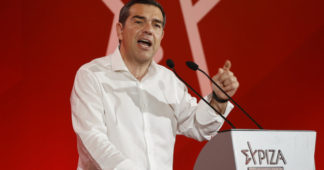Greece goes to the polls on Sunday for the second time in just over a month. While the left-wing opposition is divided, the conservative government is growing stronger. What does this mean for politics in Greece?
by Florian Schmitz
Jun 21, 2023
Nothing is going right for Greece’s left-wing politicians at present. The results achieved by the country’s leftist parties in the parliamentary election on May 21 were nowhere near as good as they had hoped after four years of Kyriakos Mitsotakis’ conservative right wing rule.
Despite a series of scandals, Prime Minister Mitsotakis and his New Democracy (ND) party were able to improve their result by a percentage point, taking them over the 40% mark.
Opposition leader Alexis Tsipras and his leftist alliance Syriza dropped from 30% in 2019 to just 20% this year. His former party colleague and now opponent, Yanis Varoufakis, whose MeRA25 party held nine seats in the previous Greek parliament, fared no better, polling at under 3%, which would not be not enough to remain in parliament.
Despite being the clear victors in the election, ND did not get enough votes to rule alone, so Mitsotakis called for a second election on June 25.
A divided opposition
Maria Dariotaki, a 19-year-old archeology student campaigning at a MeRA25 stand in Athens, was disappointed by the result. She wants to persuade young people in particular to get out and vote on Sunday.
The most important thing for her is that voters on the left don’t vote for Tsipras and Syriza. Dariotaki feels the former prime minister, who once carried the hopes of the country’s left, has lost all credibility. “During the crisis, he promised us that he would abandon austerity. Then, after 61% of voters in the 2015 referendum backed an end to austerity, Syriza did a U-turn.”
Dariotaki has no doubt that Tsipras’ decision to move ahead with austerity proposals eight years ago robbed the country of the chance of a new left-wing start.
Lasting damage to the left
To this day, Tsipras’ U-turn after the July 5 referendum in 2015 was a shock from which many left-wing voters in Greece have never recovered. It led to a split within Syriza during which several high-profile figures — including Varoufakis, the former finance minister — left the party.
All attempts to rescue the ruling left-wing alliance failed. Tsipras resigned as prime minister in August 2015 and elections were held. Even though Syriza emerged victorious and Tsipras served as prime minister until July 2019, the cracks in Greece’s left wing have never been repaired.
No left-wing alliance
This is one reason why the great left-wing alliance of which Tsipras spoke in the run-up to the May election was simply implausible. None of the leaders of the other left-wing parties showed any interest in it.
For Nikos Androulakis of the social-democratic PASOK, an alliance with Tsipras would be a tough sell. PASOK — once a major party in Greece — doesn’t enjoy a good reputation. Many associate it with the corruption and nepotism of the 1980s, which is why many PASOK supporters and members switched to Syriza before 2015.
Varoufakis, who has lauded MeRA25 as a real left-wing alternative to Tsipras, also rejected talk of an alliance with Syriza. “We will not work with Syriza. Where’s the difference between them and New Democracy?” he said.
The only remaining party is the Communist Party of Greece, which refuses to join any government coalitions until Greece officially becomes a socialist country.
Many young voters unable to vote
The results of the election on May 21 showed that despite widespread disappointment, support for left-wing parties is relatively high among young people. Some 28% of voters between the ages of 17 and 24 voted for Syriza, which got only 20% of the total vote.
The fact that many voters in this age group have already found seasonal work and cannot vote is a boon for Mitsotakis. Twenty-two-year-old Giannis Zisis comes from a village northwest of Athens but lives, studies and works in Thessaloniki. Many young people are registered where their parents live and would have to travel back home to vote.
Zisis would love to be able to vote, but his employer was not willing to give him the day off for either this election or the previous one. There is no postal vote in Greece.
“I’m not happy with New Democracy,” he told DW. “I would have voted left wing — either Syriza or MeRA25.” Nevertheless, Zisis is also critical of Tsipras.
“When my friends and I discuss the situation, I notice that many people my age are disappointed in him.” Young people have no prospects, he explained.
Strong government, weak opposition
Athens-based political scientist Dimitris Christopoulos considers Tsipras to be in a very weak political position, adding that Tsipras was better as prime minister than leader of the opposition.
“What we saw on May 21 was just a symptom of a longer crisis that began eight years ago,” he said. Christopoulos feels that after the difficult years of government, Tsipras lost his way. “He thought that the closer he moved toward conservative positions, the more likely his political survival would be.”
According to Christopoulos, the upshot of this was that the left wing in Greece, which was traditionally very strong, no longer felt represented. He warned that the crisis on the left also has implications for the role of the opposition as a key part of the democratic system.
Christopoulos said that while left-wing parties are caught up in personal conflicts, the strong New Democracy government can steer the country almost without scrutiny. He is convinced that caution is needed.
“Perhaps we are moving toward a new kind of system where the right wing will be in power for a long time, leading the country toward a quasi-illiberal system with authoritarian traits,” he suggested.
He went on to say that this would mean that scrutiny of the government by parliament, independent institutions and the media would be extremely weak. “In this way, Greece would end up following in the footsteps of Central European countries and Italy,” Christopoulos told DW. It’s a scenario he considers “highly probable.”
Meanwhile, Mitsotakis is hoping for an absolute majority in Sunday’s election. He has categorically rejected the idea of forming a coalition and has repeatedly warned that, if necessary, the Greeks will have to go to the polls again in August.
This article was originally published in German.
We remind our readers that publication of articles on our site does not mean that we agree with what is written. Our policy is to publish anything which we consider of interest, so as to assist our readers in forming their opinions. Sometimes we even publish articles with which we totally disagree, since we believe it is important for our readers to be informed on as wide a spectrum of views as possible.











